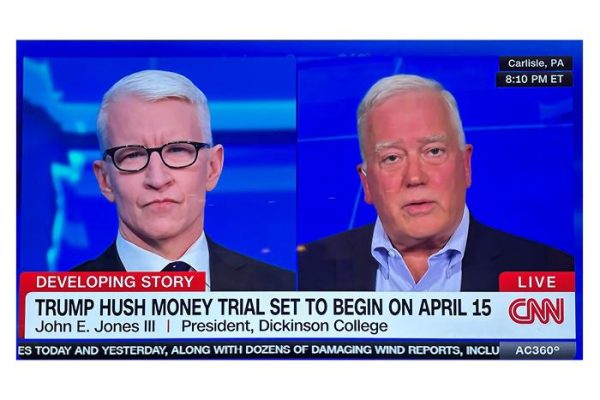KE and SSDP Hold Panel to Honor Clarke
On Wednesday, April 27, almost 150 students and members of the Dickinson and Carlisle community gathered together in ATS to commemorate the life of Alex Clarke ’12, who passed away last year from a heroin overdose. Clarke’s fraternity, Kappa Sigma, and Students for Sensible Drug Policy (SSDP) sponsored the event, which included a tribute to Clarke and a panel on the country’s current heroin epidemic.
According to Vice President of Kappa Sigma Kellen Edmonson ’17, the idea for an event to honor Clarke’s life was brought up at an alumni association meeting. Edmonson took charge of organizing the event, contacting Clarke’s parents and partnering with SSDP. The organizers decided that a panel was the most meaningful forum to commemorate Clarke while also spreading awareness of the problem of drug abuse.
Edmonson delivered the introductory speech, drawing heavily from Clarke’s mother’s words at his memorial service. He shared the wishes of Clarke’s parents to prevent similar tragedies from occurring, and their message to Dickinson students to reach out to the family members of friends suffering from addiction or other mental illnesses.
Edmonson described Clarke as a loyal, generous, kind and smart young man, but one who suffered from anxiety, eating disorders and drug abuse. A photo slideshow displayed images of Clarke’s life, including childhood family photos and photos from his Dickinson graduation. The forum’s pamphlet featured photos of Clarke from his closest friends.
Caleb Gutwillig ’18, president of SSDP, introduced and moderated the panel. The panelists included SSDP Regional Coordinator Jake Agliata ’14, associate professor of Philosophy Chauncey Maher and Jack Carroll, executive director of the Cumberland-Perry Drug and Alcohol Commission.
The panelists discussed the importance of education regarding drug use and abuse, methods to prevent more deaths from drugs and the need to recognize addiction as a mental illness. Panelists stressed the importance of combating the drug problem through rehabilitation rather than incarceration, and shared their opinions on controversial “harm reduction” rehabilitation methods such as safe injection sites, good Samaritan policies, drug testing and needle exchanges. Maher and Agliata each commented on the racial tensions within the “War on Drugs,” and argued that only when drug addiction begins to affect white, wealthy, communities is it seen as an “epidemic.”
Edmonson and Gutwillig each felt that the event fulfilled its goal of educating community members about drug addiction and commemorating Clarke’s life.
“I hope his story and experiences spark a larger dialog in the community,” said Gutwillig, who felt the panelists did an “excellent” job, but expressed regret that marginalized groups in the story of America’s drug problem were underrepresented.
Edmonson stressed that although the event successfully started the conversation about addiction and helped shatter the stigma, he “hopes the conversation continues.”




Harold A. Maio • May 5, 2016 at 5:45 pm
In what way does saying there is a “stigma” help? I can think of no positive result.
Kellen Edmondson • May 7, 2016 at 11:25 pm
Hey Harold,
I appreciate your comment.
We understood that a stigma exists and not only did we say that the stigma existed but we also did our best to try and shatter it – I think you’re wrong when you say that there is no positive result. Heroin and opiod abuse are problems in our area and it was not a topic of conversation that was continually occurring at Dickinson. With events such as ours, we felt as though such discussions are now occurring and people feel more compelled to talk about the issue.
Hope you see where I’m coming from!
Best,
Kellen